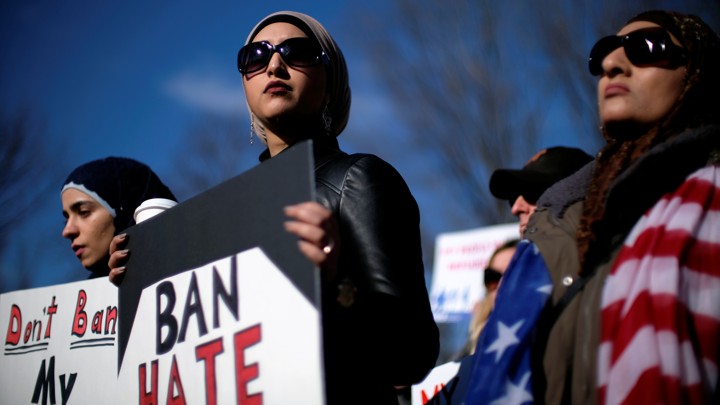The Tax-Code Shift That’s Changing Liberal Activism
The Atlantic

The late 20th-century model of liberal activism revolved around two institutions: labor unions and “public charities.” Labor unions not only bargained with employers on behalf of their employees but also supplied extensive support to Democratic electoral campaigns. Public charities, organized under section 501(c)(3) of the Internal Revenue Code, undertook a wide range of civic activities and brought a constant stream of lawsuits in the public interest.
Read: Is for-profit the future of non-profit?
This model had been fraying long before the Trump presidency. Labor unions, under sustained attack from the right, suffered a steep decline in membership and clout over the latter half of the 20th century. Public charities continued to proliferate, but as progress on racial integration stalled out and levels of economic inequality and partisan polarization crept up and up, many on the left began to question whether a court-centric approach was capable of producing lasting social change.
The 2016 election pushed these concerns past the breaking point. Thousands upon thousands of well-established public charities, after all, didn’t translate into robust voter turnout. Nor did they halt the ascent of a demagogue. And with Brett Kavanaugh’s recent confirmation, whatever remained of the left’s faith in the Supreme Court as an engine of justice has crumbled. While lawsuits may be crucial for challenging certain flagrant abuses of power, many resistance groups feel compelled to participate directly in the rough-and-tumble of electoral politics.
And so they have turned to … section 501(c)(4) of the Internal Revenue Code. Many of the key groups founded to resist Trump, including Indivisible Project, Onward Together, Our Revolution, Sixteen Thirty Fund, Stand Up America, and Women’s March, are abandoning the 501(c)(3) public-charity route and incorporating as 501(c)(4) “social welfare” organizations instead. Social-welfare organizations are also exempt from federal income tax, but they have fewer fiscal privileges. Donations to them are not deductible. Yet unlike public charities, they may lobby as much as they wish, and they may engage in partisan political work—from asking candidates to sign pledges to registering like-minded voters to endorsing specific pieces of legislation—as long as that work is not their “primary” purpose or activity (a requirement so hard to define and enforce that, in the words of one leading nonprofit tax scholar, it “virtually invites wholesale noncompliance”). Since this past summer, social-welfare organizations have also been allowed to withhold the names of their donors from the Internal Revenue Service.
Read: The liberal Millennial Revolution
Together with affiliated political-action committees (pacs), conservative social-welfare organizations such as Americans for Prosperity and Crossroads GPS spent massive amounts over the past several election cycles. Liberals initially responded with alarm at the “politicization” of the 501(c)(4) category. Now they are following suit.
Federal tax law allows social-welfare organizations to be affiliated with public charities as well as with pacs. So while anti-Trump start-ups are setting up shop as 501(c)(4)s, long-standing civil-liberties and civil-rights groups are reallocating resources to (c)(4) arms. In fiscal year 2017, for example, total assets of the American Civil Liberties Union’s (c)(3) grew 17 percent. Total assets of its (c)(4), on the other hand, grew 89 percent. This past June, the Southern Poverty Law Center spun off a (c)(4), the SPLC Action Fund. The NAACP went further and transformed itself entirely last year from a 501(c)(3) into a 501(c)(4). This restructuring was necessary, the incoming president explained, for the NAACP to “have the collective voice and impact that a civil-rights organization in 2017 and forward should have.”
The Republicans’ recent overhaul of the tax code will likely push more nonprofits in the 501(c)(4) direction. Under the “Tax Cuts and Jobs Act,” most taxpayers will not itemize their deductions and so won’t be able to get any tax benefits from donating to a 501(c)(3), which means that public-charity status is now less relevant to fund-raising. Giving to public charities declined immediately following the tax bill’s enactment, and tax lawyers are starting to steer super-wealthy philanthropists to social-welfare organizations. The 501(c)(3) golden handcuffs have become a little less golden.
Meanwhile, “alt-labor” groups are moving into the 501(c)(3) category that others on the left are fleeing. Traditional unions that engage in collective bargaining on behalf of dues-paying members are classified as “labor organizations” under the tax code. With that category squeezed by right-wing legislatures and courts, worker centers and industry-wide nonprofits such as the National Domestic Workers Alliance, Restaurant Opportunities Center United, and Retail Action Project are operating as 501(c)(3)s and picking up some of the slack through innovative methods of organizing and advocacy.
Read: Obama’s plan to crackdown on political dark money
As the legal architecture of campaigns for racial, social, and economic justice continues to evolve, public charities will remain core pillars. Their numbers alone assure this. Even so, the shift toward 501(c)(4)s, pacs, and hybrid legal structures represents more than just a temporary adaptation to Trumpism. It signals the possible emergence of a distinct brand of legal liberalism for the 21st century—one less oriented around lawsuits and tax-subsidized donations and more closely connected to partisan politics and grassroots organizing. Well before the Kavanaugh-confirmation fight, liberal activism’s center of gravity was already tacking away from the courts.
Amid all this uncertainty and change, one point seems clear enough. For the foreseeable future, the nation’s political welfare will increasingly be bound up with social-welfare organizations.
We want to hear what you think about this article. Submit a letter to the editor or write to letters@theatlantic.com.







Follow Us!